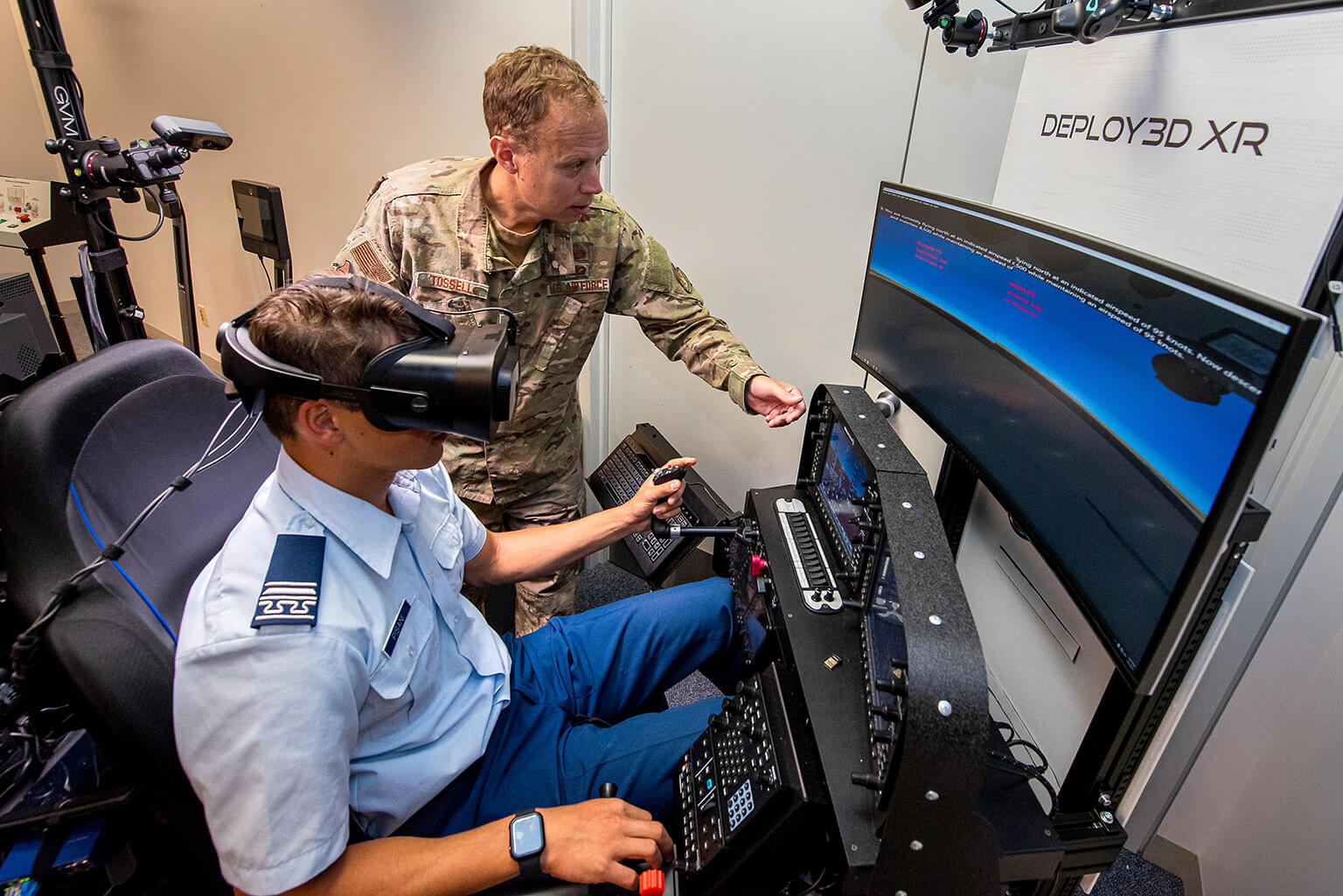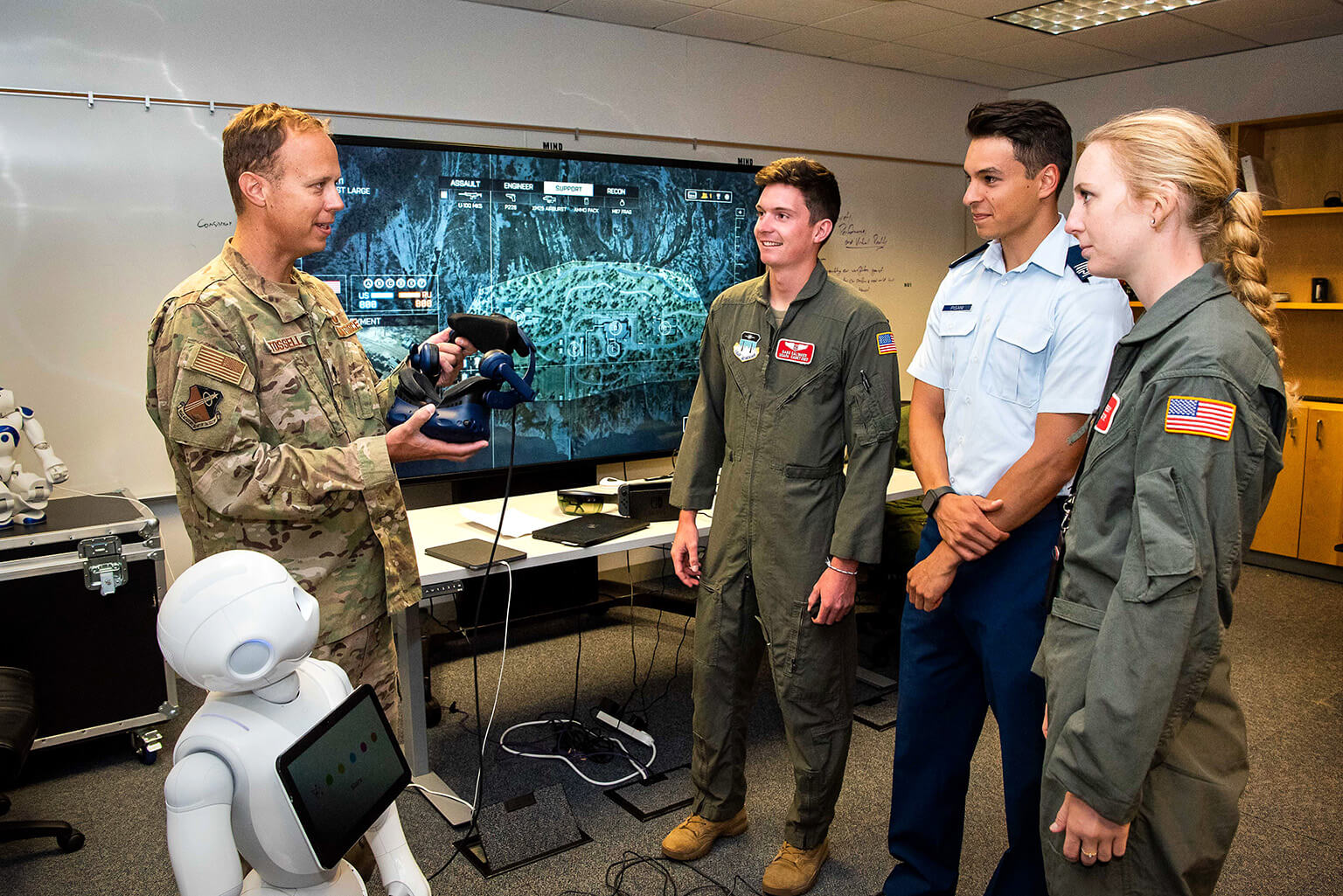Professor prepares warfighters using advanced technology, behavioral science research

By Ashley Murphy, Strategic Communications
Military operations live at the intersection of technology and human cognition. How those two things work together in the future is, in part, at the hands of U.S. Air Force Academy cadets. That’s why Lt Col Chad Tossell is passionate about using research to ensure tomorrow’s leaders will be successful by preparing cadets to be warfighters through a wide-range of experiences inside and outside of the classroom.
“The research I lead with cadets extends the most advanced technologies including artificial intelligence, virtual reality, and wearable computing. These systems, and others, will be a part of future conflict and it’s important for cadets to understand their technical capabilities, as well as how they integrate with future operations,” said Tossell, Senior Advisor to the Warfighter Effectiveness Research Center (WERC).
As the military continues to integrate advanced technologies, cadets study how this affects the warfighter and ultimately the strategy of war. “The human element of warfare is critical across air, space, and cyber domains,” said Tossell.
The Academy was recently awarded an Air Force Office of Scientific Research (AFOSR) grant to study human and artificial intelligence teaming. A research cohort consisting of cadets and faculty members will conduct a series of studies examining the trust, influence, and ethics between humans and artificial intelligence. They will do so using behavioral, physiological, and subjective measures with the goal to better understand and navigate how artificial intelligence can successfully be integrated in future conflict environments; thus enhancing our warfighting capabilities.
Cadets are also learning the importance of humans to effectively employ these advanced systems. As technology is becoming more intelligent and pervasive, researchers are finding that the warrior spirit – the will to fight and sacrifice, strength of character, and spiritual formidability — remains critical in conflict.
“The Academy is unique in providing experiences to deliberately instill a warrior ethos,” Tossell said. “Cadets develop the ethos, resolve, values, and understanding of how their knowledge and skills are necessary for future conflict.”
Getting to WERC
Started in 2013, the Warfighter Effectiveness Research Center (WERC) serves as the research arm of the Department of Behavioral Sciences and Leadership, and facilitates faculty and cadet research that enhances warfighter effectiveness. Their innovative projects are based in the behavioral sciences and connect to a broad range of disciplines and collaborators across government labs, academia, industry, and military operators.
“Cadets have to be ready to fight the conflicts of tomorrow. These conflicts will be more non-linear, complex, and difficult than ever before. To ensure we can meet these challenges, I firmly believe in providing cadets opportunities to apply their academic, training, and athletic education towards real-world problems,” Tossell said.
Some of the projects cadets are currently working on include designing an intelligent robotic system to assist in ethical and precise targeting, developing AI-based virtual reality flight training, studying trust in automation using an electric vehicle, and examining the factors crucial to combat motivation.
Tried and Tested
As someone who has led in combat, Tossell believes that the Academy’s airmanship, space, and cyber experiences provided to cadets effectively prepares them to lead future warfighters. “It seems these experiences are woven into the tapestry of USAFA like never before,” he said.
Lt Col Tossell is a 2003 graduate from University of California with a degree in psychology. He has led cadet-mentored research in flight training, and command and control at the Academy; as well as previously served in the Air Force Research Laboratory and deployed to Afghanistan in 2014 as the Director of Operations for the Security Assistance Office in Kabul. Prior to his current role at the Academy, at U.S. Northern Command he helped stand up the Homeland Defense Institute, which is sponsored by the Academy’s Institute for Future Conflict. “I am really passionate about the Homeland Defense Institute because it recognizes the importance of research and innovative thinking in solving some of our nation’s most complex challenges,” he said.
Currently, Tossell teaches Human Factors Engineering courses, leads several warfighting-focused capstone projects, and serves as a senior military faculty member in the Department of Behavioral Sciences and Leadership. His breadth of experience has helped to prepare cadets for the unknown environments that await their expertise.
“The research our cadets are accomplishing at an undergraduate level is both advanced and applicable to their futures as leaders — in a more applicable and technologically-advanced environment than they will get anywhere else,” he said. “I am honored to be a part of it.”
For more information on the Warfighter Effectiveness Research Center, click here.
